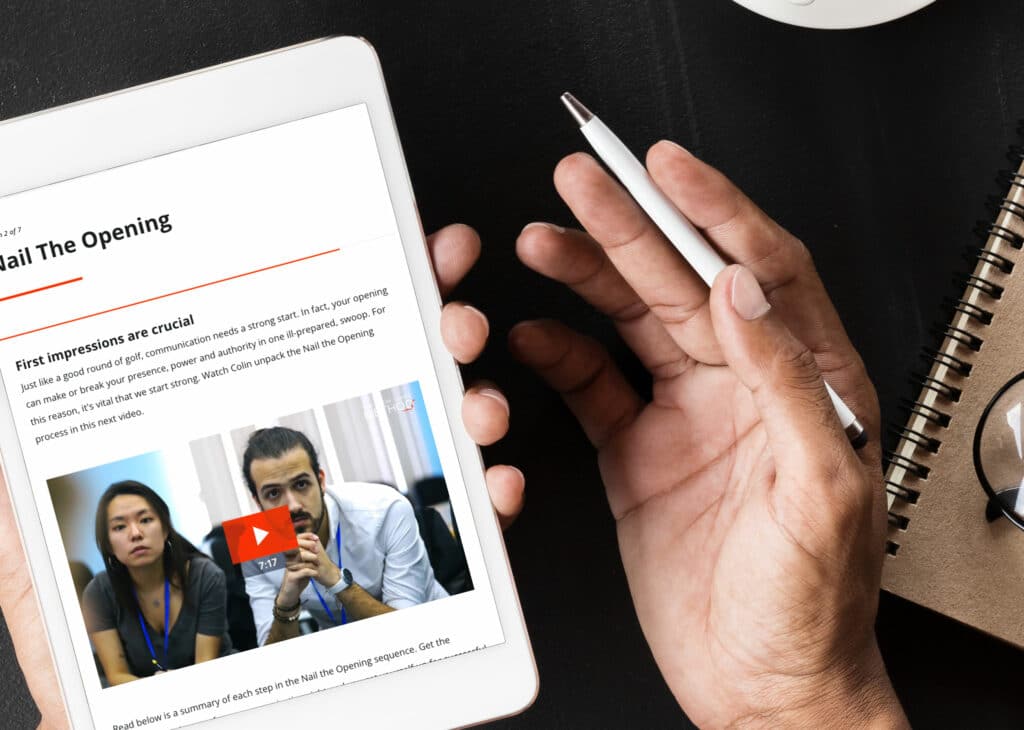Clients are always asking me what the most important leadership traits are, particularly during times of rapid change or uncertainty. So I decided to distill one of my favourite TEDTalks by US army general, Stanley McChrystal, into 10 leadership lessons for senior executives.
10 leadership lessons from a US army general for success in tough times
1. Pick your battles
Just as McChrystal quietly complies with the protocols and preparation of a parachute jump, there are also times in the corporate world where the rules of the game should simply be followed. There are other times however, when the right move is to create new rules. A key leadership trait is knowing when to comply and when to step in and fight for change. Understanding when to “pick your battles” is a skill that empowers good leaders to accept what is better left unchanged while solving what we can. While there should always be a strategy in place, like the paratroopers’ drop, twist and roll, it’s important to recognise that things may play out differently and have the agility to execute a different move if necessary.
2. It’s not about you
In the army, after an intense parachute jump, you might ask yourself, “why didn’t I go into banking?” Similarly, as a corporate leader during tough times, you might ask yourself, “why am I putting myself through this?” But just as McChrystal describes looking around at the other paratroopers, the more junior members of the team, we remember that it’s not about you. It’s about the team, and they’re relying on you to lead them through this crisis and out the other side. This is perhaps the most critical leadership trait, because if that doesn’t hook you back into why you’re there, maybe you shouldn’t be.
3. Prepare for the unexpected
As a leader, it’s your job to ensure your team is prepared for crisis situations – not just in theory but in practice. They’re ready, they know exactly what to do, what protocols to follow and who is in charge. We’ve all seen how disruption can come along at any time and cause dramatic changes to our world. This is exactly what happened with COVID-19. How many of us were truly ready? Preparing your team for the unexpected is the cornerstone of good crisis leadership.
4. Change begins with you
Change is often least embraced by the people at the top, but that’s often where it’s most necessary. If you’re in a leadership position, you are likely to have years of experience. However, experience is not gospel. There must always be room for change. In unprecedented situations, like 9/11 or COVID-19, the old rules don’t necessarily apply. Real values can endure but flexibility in approach may be needed. This is how to lead through change like significant category disruption or supply chain failure.
5. Allow people to fail
In my experience, this is a relatively rare leadership trait but such an important one. We all make mistakes, even Company Commanders like McChrystal. And sometimes those failures have major consequences. But from mistakes comes growth, learning and experience. By creating an environment in which your team feels comfortable enough to experiment and sometimes make mistakes, you’re allowing them to develop and improve. In this way, good leaders allow people to fail without seeing them as a “failure”.
6. Agility and pace in VUCA situations
VUCA stands for Volatile, Uncertain, Complex and Ambiguous. These high-risk situations demand rapid change. However, critical thinkers (traditionally highly prized in the corporate world) generally need more time and precise data to make important decisions. Since these aren’t available in VUCA contexts, organisational leaders must embrace a more agile approach. Pace is one of the most important leadership traits when it comes to VUCA environments.
7. Embrace the reality of remote working
Just as McChrystal was suddenly leading a force across 20 countries, today’s leaders are dealing with remote teams as a result of globalisation and sudden changes like COVID-19. Technology has enabled us to do this, but it’s critical that we use it not just for basic communication but for effective leadership. Mutual trust and confidence has to be as strong via electronic media as in person. It’s worth noting that the reasons and events that inspired you to get into the industry may be completely irrelevant to a team member who never knew a time before social media. A shared purpose and shared consciousness must be identified in order to stretch across geography, generation and demographics.
8. Trust the expertise of others
Just because you’re leading, it doesn’t mean you know all the answers. When the stakes are high, we reflect on the advice or information provided by people we trust. That includes our team members, contractors and specialists. This is what McChrystal calls “inversion of expertise” (i.e. people below you may know more than you, the leader). In fact, allowing decisions to be made further down the corporate hierarchy and closer to the customer can facilitate swift, positive action during a crisis. Good leaders are willing to learn from and trust in their people.
9. Be there for your team
McChrystal says, “relationships are the sinew that hold the force together.” The “Ranger Creed” dictates that no fallen comrade will ever fall into the hands of the enemy; every Ranger promises that, no matter what it costs, “if you need me, I’m coming.” Not only that but they live up to it. This is an important leadership quality in the corporate world. Be there for your team. Go into bat for them. Protect them. Support them. Celebrate them. Be responsible for them. They’re an extension of you, not simply colleagues to whom you’re senior.
10. Resilience
Nobody said it was going to be easy. If it was, it wouldn’t be so rewarding. You will get knocked down from time to time, and it will hurt. If you’re a good leader, there will be people you can count on to pick you up, whether that be your team, your mentor, or someone in your personal life. Whatever the challenge, you must always get back up. Resilience in leadership is essential because, never forget, the people who count on you, need you on your feet.
If your organisation needs help supporting its leaders, The Colin James Method® provides leadership facilitation at EXCO board meetings, off-sites and other high-level scenarios to enhance your people’s leadership traits and help them get the most out of leadership situations. Find out more here.
The Colin James Method® Facilitators train corporate executives to improve their professional communication skills with a proven methodology. Our highly trained Facilitators and Coaches are recognised for their experience in their fields and have worked with many individuals and organisations around the world to master the art of communication.
FAQ
What leadership traits make a good leader?
Based on US army general Stanley McChrystal’s TEDTalk, we determine the following leadership traits to be necessary in a good leader: commitment to your team, resilience, willingness to change, capacity to trust others and their expertise, smart use of technology, allowing others to fail, preparedness for a crisis, knowing when to pick your battles, relationship building, and agility.
Why are leadership traits and management skills important?
Without good leaders and solid management skills, organisations run the risk of having experience and specialist expertise but no direction. Without direction and purpose, the organisation will struggle to succeed and is likely to become unprofitable.
Which leadership traits to work on if you want to succeed?
The most important leadership traits to focus on for success in tough times are resilience, willingness to change or adapt, agility, and effective communication.














